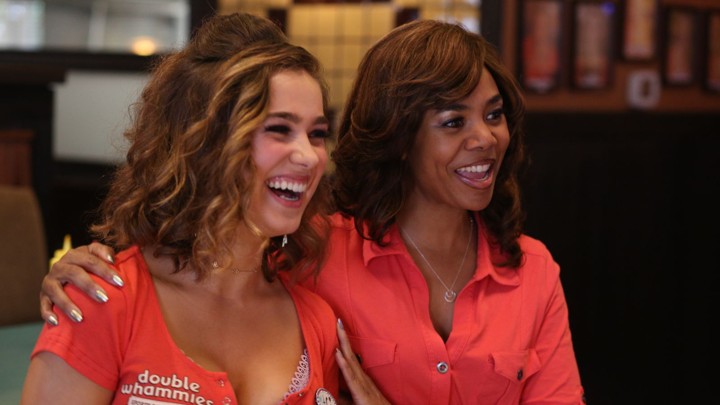Alex writes about Andrew Bujalski’s Support the Girls.
There’s a scene in the opening third of Support the Girls where two of the leads go to a home audio store in order to sit through a home theatre demonstration that will hopefully help them borrow a speaker system for their on-going car wash. As Lisa (Regina Hall) lingers in the background behind her employee Danyelle, so does the scene. In no other movie would this scene last as long as it does, but this is an Andrew Bujalski movie, where minutiae comes into focus.
Lisa stares at the demonstration as various incongruent sounds are mixed, and a voiceover emerges to encourage its participants to understand and appreciate the power of the sound around them. Then Lisa goes back to work, because that is what Lisa always does.
Support the Girls is a film about managing a restaurant/bar called Double Whammies, a restaurant just off the highway in Texas that can most easily be described as Hooters-esque. Lisa is a sort of godmother to her employees and the business itself; throughout the movie we see that she is empathetic, able to engage multiple skillsets simultaneously, and in general seems like exactly the kind of person you would want to run a business. Regina Hall, as it has been validly noted in seemingly every review for the film, gives a charismatic and deeply warm performance. Anybody who has ever had a really good manager at a workplace that doesn’t always deserve a really good manager can see somebody they know in Lisa, and it is nice to see this particular sort of character portrayed so well.
Throughout the film, which captures a day in Lisa’s life running the restaurant, we see the various hoops she has to jump through, and meet the various people she jumps through these hoops for. Through it all, Lisa maintains an unwavering compassion for those she works with, even when there might be reasons not to. She seems to truly love Maci, a woman who could easily be incredibly overbearing. After realizing a cook had a role in an attempted robbery of the restaurant, Lisa lets that cook quit at the end of his shift as opposed to firing him and/or having him arrested. Lisa navigates her world with grace and compassion, and that’s pretty much the whole movie. Support the Girls is a simple movie done well, an engaging entry into the day in the life genre that is well worn but perpetually effective. Towards the end of the film, though, Lisa quits her job. She decides she has finally had enough, and walks out to go home.
After Lisa has left Double Whammies in her wake, Maci and company are stuck corralling a situation that Lisa (presumably) could have easily settled. While waiting for the cable to kick back in, patrons start to get restless as they worry they will miss the evening’s boxing match. Maci leads the charge for the remaining employees of Double Whammies, hopping up on the bar to settle the crowd.
As Maci begins talking about how much she cares about those around her, co-workers or otherwise, the sound design cranks up the sound of the crowd talking over her. The sounds are so loud to the point of being obviously fake, and the number of voices on the track is clearly higher than the number of customers currently in Double Whammies. In a film of mostly unnoticeable minutiae, this capital-C choice stands out even further than it would in another film. We hear the sounds of the faceless crowd drowning out those we have been listening to up to this point, those the film has been pointing out to us as good, decent, well-meaning people. And they’re cancelled out by a frothing crowd that wants to see a boxer rip another boxer to shreds.
In the final sequence of the film, Lisa is at an interview for a manager position at Mancave, the corporate chain equivalent of Double Whammies. On her way out, she runs into Maci and Danyelle, who have been fired from Double Whammies for the calamity left by an absence of responsible, caring leadership. Lisa waits for Maci and Danyelle to go through their interviews to be Mancave servers, and then the trio make their way up to the roof for a quick hangout and tequila swig.
On the roof, these three women talk about their lives and the world, all while the unrepentantly repetitive ambient sounds of freeway traffic pass them by. This is a world of transience, and all these people have places to be, and people to ignore to get there. In the final moments of the film, Lisa, Maci and Danyelle scream at nobody and nothing in particular as the traffic whizzes past below. Again, the sound design is so loud that it is impossible not to notice. The screams are piercing. And then the film ends.
This is not a smooth transition, and the following paragraph will seem tangential. I do not care.
I have been wondering why the returns of Aziz Ansari* and Louis CK this past week have been bothering me. Given the close knit, relatively small community that is superstar stand-ups, I find it impossible to believe that Ansari and CK did not discuss the idea of returning to the stage near each other, relatively close both temporally and spatially. It seems like a discussion was had and a plan was made in order to keep a little bit of the heat off of the other. (If nothing else, I’m certain CK gained encouragement from the fact that Ansari’s appearance in Wisconsin wasn’t immediately met with metaphorical pitchforks.) Although that may not have mattered, given the mostly rapturous reception CK got in particular for his return to the Comedy Cellar, receiving a standing ovation before he said a word. This is not an issue that I feel qualified to comment on, because I don’t view myself as learned enough to have a proper response. But I know when something feels wrong, and I know that this feels wrong and gross and conspiratorial, and I wish somebody could hear the people being ignored under the applause. Because the applause is not going to go away.
*It should be noted that Ansari did a set at the Comedy Cellar in New York in May. It seems that now his full-on return to the stage is happening though.
So much noise can signify little more than nothing, and usually a scene like the ending of Support the Girls would make me feel uncomfortable. It seems to be implying that screaming anything against the repetitive noise, even something unintelligible, is better than screaming nothing. But then you remember the discussion of sound earlier in the film, the importance of listening, and it comes through. These women are screaming to be heard above all those who are ignoring them, and they’re screaming so loudly that it’s borderline unpleasant for the viewer to sit through. There is a reason for the screams though, and a reason worth hearing. But the cars don’t stop, because the cars never seem to stop.





